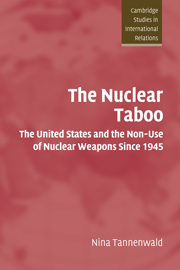Book contents
- Frontmatter
- Contents
- Preface
- List of abbreviations
- 1 Introduction: the tradition of nuclear non-use
- 2 Explaining non-use
- 3 Hiroshima and the origins of the nuclear taboo
- 4 The Korean War: the emerging taboo
- 5 The rise of the nuclear taboo, 1953–1960
- 6 Nuclear weapons and the Vietnam War
- 7 Institutionalizing the taboo, 1960–1989
- 8 The 1991 Gulf War
- 9 The taboo in the post-Cold War world
- 10 Conclusion: the prospects for the nuclear taboo
- Select bibliography
- Index
- CAMBRIDGE STUDIES IN INTERNATIONAL RELATIONS
10 - Conclusion: the prospects for the nuclear taboo
Published online by Cambridge University Press: 22 September 2009
- Frontmatter
- Contents
- Preface
- List of abbreviations
- 1 Introduction: the tradition of nuclear non-use
- 2 Explaining non-use
- 3 Hiroshima and the origins of the nuclear taboo
- 4 The Korean War: the emerging taboo
- 5 The rise of the nuclear taboo, 1953–1960
- 6 Nuclear weapons and the Vietnam War
- 7 Institutionalizing the taboo, 1960–1989
- 8 The 1991 Gulf War
- 9 The taboo in the post-Cold War world
- 10 Conclusion: the prospects for the nuclear taboo
- Select bibliography
- Index
- CAMBRIDGE STUDIES IN INTERNATIONAL RELATIONS
Summary
[Regarding the 2002 India–Pakistan crisis:] The whole world would condemn whoever [uses a nuclear weapon] and I think that is a sobering reality that both understand … It is not just another weapon in a toolbox of weapons. It crosses a line that the world does not want to see crossed in 2002. And the condemnation that would go against whichever country did it would be worldwide and it would be immediate …
Secretary of State Colin Powell, 2002… we went through the Korean War, we went through the Vietnam War, we've gone through the war on terror and we've not used nuclear weapons. That ought to say something about the threshold with respect to nuclear weapons.
Secretary of Defense Donald Rumsfeld, 2003The nuclear taboo has been a powerful force inhibiting US resort to use of nuclear weapons since World War II. No taboo existed in 1945, but from the Korean War, when an emerging taboo entered deliberations mostly as an instrumental consideration, to the 1991 Gulf War, when it had become more embedded and internalized, it has restrained use of nuclear weapons, both by appearing as a “constraint” to actors and by engendering more constitutive processes of stigmatization and categorization. Despite cases where nuclear weapons were perceived to have military utility, US leaders have ruled out their use for political and normative reasons. Ultimately, in delegitimizing nuclear weapons, the nuclear taboo has constrained the practice of “self-help” in the international system.
- Type
- Chapter
- Information
- The Nuclear TabooThe United States and the Non-Use of Nuclear Weapons Since 1945, pp. 361 - 396Publisher: Cambridge University PressPrint publication year: 2007

